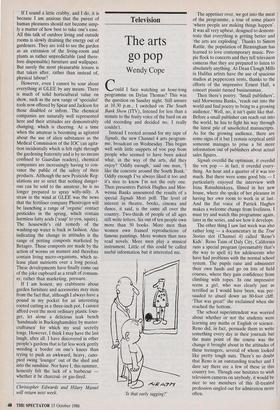Television
The arts go pop
Wendy Cope
Could I face watching an hour-long programme on Dylan Thomas? This was the question on Sunday night. Still unsure at 10.30 p.m., I switched on The South Bank Show (ITV), listened for less than a minute to the fruity voice of the bard on an old recording and decided no, I really couldn't.
Instead I rooted around for my tape of Signals, the new Channel 4 arts program- me, broadcast on Wednesday. This began well with little snippets of vox pop from people who seemed to have been asked what, in the way of the arts, did they enjoy? `Oddly enough,' said one man, `I like the concrete around the South Bank.' Oddly enough I've always liked it too and it's nice to know I'm not the only one. Then presenters Patrick Hughes and Mor- wenna Banks announced the results of a special Signals Mori poll. The level of interest in theatre, books, cinema and dance, it said, is the same all over the country. Two-thirds of people of all ages still write letters. Six out of ten people own more than 50 books. More men than women own framed reproductions of famous paintings. More women than men read novels. More men play a musical instrument. Little of this could be called useful information but it interested me.
Is that early tagging?' The appetiser over, we got into the meat of the programme, a tour of some places `where people are making things happen'. It was all very upbeat, designed to demons- trate that everything is getting better and `the arts are exploding'. Thanks to Simon Rattle, the population of Birmingham has learned to love contemporary music. Peo- ple flock to concerts and they tell television cameras that they are prepared to listen to absolutely anything. At Dean Clough Mills in Halifax artists have the use of spacious studios at peppercorn rents, thanks to the efforts of the impressive Ernest Hall, a concert pianist turned businessman.
Then there's poetry. `Small publishers', said Morwenna Banks, 'reach out into the world and find poetry to bring to a growing audience.' Well, no, it isn't quite like that. Before a small publisher can reach out into the world, he has to fight his way through the latest pile of unsolicited manuscripts. As for the growing audience, there are some signs of it but I remain sceptical until someone manages to prise a bit more information out of publishers about actual sales figures.
Signals overdid the optimism, it overdid the vox pop — in fact, it overdid every- thing. An hour and a quarter of it was too much. But there were some good bits — I particularly enjoyed the interview with Irina Ratushinskaya, filmed in her new house, where she spoke of her pleasure in having her own room to work in at last. And the flat voice of Patrick Hughes makes a welcome change from liveliness. I must try and watch this programme again, later in the series, and see how it develops.
The other thing I saw last week was also rather long — a documentary in the True Stories slot (Channel 4) called `Reno's Kids'. Reno Taini of Daly City, California runs a special program (presumably that's the way to spell it) for adolescents who have had problems with the normal school system. The pupils raise and administer their own funds and go on lots of field courses, where they gain confidence from climbing with ropes. In one impressive scene a girl, who was clearly just as terrified as I would have been, was per- suaded to abseil down an 80-foot cliff. `That was great!' she exclaimed when she reached the bottom.
The school superintendent was worried about whether or not the students were learning any maths or English or science. Reno did, in fact, persuade them to write something every day in their journals but the main point of the course was the change it brought about in the attitudes of these teenagers, several of whom looked like pretty tough nuts. There's no doubt that Reno is an outstanding teacher and I dare say there are a few of these in this country too. Though one hesitates to wish television cameras on anybody, it would be nice to see members of this ill-treated profession singled out for admiration more often.


























































 Previous page
Previous page